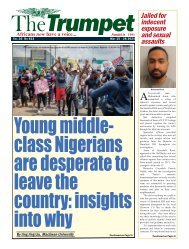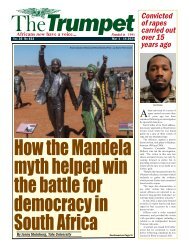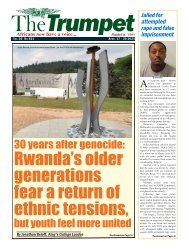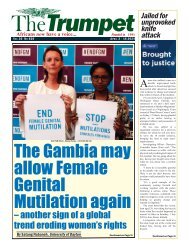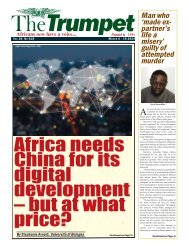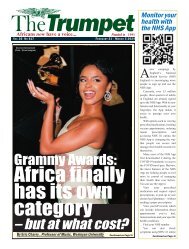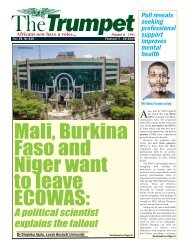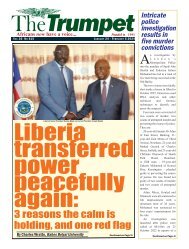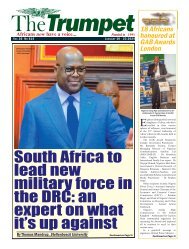The Trumpet Newspaper Issue 624 (May 29 - June 11 2024)
South Africans go to the polls to choose a new government: what's different this time
South Africans go to the polls to choose a new government: what's different this time
Create successful ePaper yourself
Turn your PDF publications into a flip-book with our unique Google optimized e-Paper software.
Opinion<br />
Page14 <strong>The</strong><strong>Trumpet</strong> MAY <strong>29</strong> - JUNE <strong>11</strong> <strong>2024</strong><br />
Celebrating Ken Calebs<br />
Olumese, <strong>The</strong> Guv’nor, at 80<br />
Continued from Page 12<<br />
and Butter and another club called<br />
Princes. On Allen Avenue, Jerry Jones<br />
Anazia ran a night club called Ace. On<br />
Toyin Street, there was Climax, with a<br />
DJ called Stagger Lee. In those days<br />
of course, there was Shrine, the main<br />
watering hole for night crawlers, and<br />
beyond Ikeja, all the way towards<br />
Ojuelegba, there was a long list of fun<br />
spots including pepper soup joints<br />
such as Igbinedion, or Fafolu: point<br />
and kill joint, No. 67 Bode Thomas in<br />
Surulere, Empire Hotel, Tarmac.<br />
Many would also remember Kakadu<br />
Nite Club in Alagomeji, Yaba, where<br />
Fela used to perform in the 60s, and<br />
Bobby Benson’s Caban Bamboo,<br />
which in many ways was the old<br />
version of what the Niteshift Coliseum<br />
later became. <strong>The</strong>re was at some point<br />
Paradiso in Yaba, Faze 2, Lord’s Club<br />
around Maryland, and Hotspot Club at<br />
Abibu Oki, off Broad Street. Basically,<br />
for a while, the Lagos social scene was<br />
a mix of band life, joints and<br />
discotheques. <strong>The</strong> latter would later<br />
prevail.<br />
Ken Calebs Olumese changed the<br />
face of night life in Lagos, particularly<br />
with the rise of the discotheque, which<br />
he capitalized upon turning Niteshift<br />
Coliseum into a space where the<br />
hottest and latest music could be<br />
heard. He invested heavily in music<br />
and equipment. He raised the bar to<br />
such a level that others began to learn<br />
from him, and even copy him. He<br />
changed the game. Even when there<br />
was a seeming rivalry between Lagos<br />
Island and the Mainland, the arrival of<br />
Niteshift Coliseum gave nightlife on<br />
the Mainland, an edge. What Olumese<br />
did was simply to be different. He<br />
carved a niche and constantly<br />
reinvented it. Whereas you could go to<br />
Ozone, DeRoof, Klass and Climax and<br />
run into celebrities and prominent<br />
persons, mingling with others, dressed<br />
in both formal and bohemian attires,<br />
Olumese made it clear from the very<br />
beginning that his club was meant for<br />
the middle class and the upper middleclass<br />
members of society. It was an<br />
exclusive club and there were rules.<br />
<strong>The</strong>re was a man at the door, “<strong>The</strong><br />
First Man” who would not even allow<br />
you to buy a ticket if you looked out<br />
of place. Jeans, slippers, any form of<br />
scruffy dressing were not allowed.<br />
You didn’t have to wear a tie, but you<br />
were required to appear decent.<br />
<strong>The</strong> club also had different<br />
segments. <strong>The</strong>re was an exclusive<br />
section reserved for Senior Fellows of<br />
the Gold Card Sector. This was a<br />
section reserved for prominent<br />
persons, diplomats, captains of<br />
industry on a discreet night out. <strong>The</strong><br />
lighting for that section was also<br />
deliberately dim. And there was the<br />
Section for the Glamour Boys (later -<br />
and Girls) of Nigeria: the reserved<br />
section for the upwardly mobile in<br />
society, but even then you had to be<br />
admitted as a member to sit there. In<br />
the general hall was the popular<br />
section. <strong>The</strong> status of a guest or<br />
member was indicated in the colour of<br />
the glass with which you were served.<br />
<strong>The</strong> staff were trained to know the<br />
differences. Everyone wanted to be<br />
part of the Niteshift crowd. Usually,<br />
when people left other clubs, they<br />
ended up at the Coliseum. <strong>The</strong> food<br />
was good. <strong>The</strong> air-conditioning was<br />
the coldest in the business. To add to<br />
the snobbery, Niteshift did not use the<br />
same terms as other clubs. Its<br />
bathrooms were called “<strong>The</strong> Vanity”<br />
for example. <strong>The</strong> hostesses wore<br />
something called “Oriental<br />
Ornamental.” <strong>The</strong> Dee Jay was “<strong>The</strong><br />
Flight Captain” sitting in “<strong>The</strong><br />
Cockpit.” And the entire night was a<br />
cruise. Olumese was the master of<br />
razzmatazz.<br />
He had a personal touch that could<br />
not be found among other club<br />
owners. He knew most of the regular<br />
clientele personally, and took an<br />
interest in their personal lives. He<br />
served drinks, and could be found<br />
correcting any error by any of his staff.<br />
His dressing was impeccable. From<br />
his hair cut to his shoes, he paid<br />
attention to every detail. He drank<br />
Remy Martin, and he could hold his<br />
drink. He was very generous to his<br />
guests. For young persons and others<br />
close to him, the first drink was always<br />
on the house, and in the morning, the<br />
club served tea or coffee on the house<br />
depending on individual choices.<br />
<strong>The</strong>re were days patrons stayed in the<br />
club till 7 am, not knowing it was<br />
daybreak. <strong>The</strong> Guv’nor of Niteshift<br />
Coliseum actively cultivated the<br />
friendship of the media. He knew<br />
every entertainment, arts and culture<br />
reporter and editor on the beat. He was<br />
similarly friendly with publishers and<br />
editors. He had one or two friends in<br />
every newsroom. Journalists were<br />
understandably some of the more<br />
prominent members of the club, and<br />
through this connection Niteshift<br />
became a place of choice for many<br />
media events. <strong>The</strong>re were times<br />
however when he had issues with<br />
journalists. He protected the privacy of<br />
celebrities who came to the club<br />
jealously and he would not hesitate to<br />
quarrel with any journalist who<br />
published gossip about any of his<br />
patrons. He used to quip that the club<br />
does not ask for marriage certificates.<br />
It is place of fun, not a church. Funny<br />
enough, Olumese is the son of an<br />
Anglican priest.<br />
Niteshift was not just about disco.<br />
<strong>The</strong> Guv’nor was constantly reinventing<br />
the concept. <strong>The</strong>re was in<br />
due course a full Niteshift band, which<br />
mixed the idea of disco with live<br />
performance. <strong>The</strong>re was also the<br />
Niteshift Musical Talent Show, on the<br />
platform of which the club provided<br />
space for the flowering of many<br />
talents including Felix and Moses,<br />
Tuface, Tony Tetuila, Tony Montana,<br />
Eedris Abdulkareem, Platanshun<br />
Boys, Sunny Neji, Daddy Showkey,<br />
Nel Oliver. <strong>The</strong>re was also Miss<br />
Niteshift beauty pageant. Niteshift was<br />
also the watering hole for many<br />
Nollywood artists – actors, actresses<br />
and producers. But the high point<br />
arrived in the early 90s when the club<br />
was moved from 21 Opebi Street to a<br />
bigger, more permanent space, the<br />
purpose-built Coliseum at 21<br />
Salvation Road, off Opebi. At this<br />
new location, the club had more space,<br />
more meeting rooms, a bigger dance<br />
floor, more of everything: an<br />
impressive edifice that was a<br />
testament to the success of the club,<br />
and the dogged vision of the founder.<br />
<strong>The</strong>re was even a place called <strong>The</strong><br />
Dacha: a block of 12 rooms reserved<br />
exclusively for the use of members.<br />
<strong>The</strong> major highlight at the Coliseum<br />
was the increased focus on a special<br />
programme which Olumese had<br />
introduced at the 21 Opebi address -<br />
the Grand House Reception (GHR).<br />
This further differentiated the Niteshift<br />
Coliseum from its peers. <strong>The</strong> GHR<br />
was an evening of interaction with<br />
major public figures. It was a huge hit<br />
which attracted exactly the clientele<br />
that the Guv’nor wanted. Some of the<br />
prominent persons who featured on<br />
the platform included, to cite just a<br />
few: Chief Emeka Odumegwu<br />
Ojukwu, Alhaji Balarabe Musa, Fela<br />
Anikulapo Kuti, Beko Ransome-Kuti,<br />
Alhaji Tafa Balogun, Mallam Nasir el-<br />
Rufai, Governor Gbenga Daniel,<br />
Governor Segun Osoba, Governor<br />
Orji Kalu, Chief Lucky Igbinedion,<br />
Asiwaju Bola Ahmed Tinubu… H. E.<br />
Flt Lt. Jerry Rawlings, Alhaji Atiku<br />
Abubakar… and others.<br />
Ken Olumese kept raising the bar,<br />
and he was good at research, and<br />
monitoring the competition. I was one<br />
of the Glamour Boys of the Club,<br />
having joined that section sometime<br />
around 1989. I would later end up as<br />
one of the club’s major resource<br />
persons. I can conveniently report that<br />
I was actively involved. On many<br />
occasions we visited other clubs,<br />
before the start of business at the<br />
Coliseum. <strong>The</strong>re were occasions when<br />
the Guv’nor would arrange for us to<br />
go on a West Africa tour. We were in<br />
Ghana again and again to attend<br />
different night clubs and observe their<br />
operations. We used to travel on<br />
Wednesday and return on Monday.<br />
Niteshift Coliseum would also<br />
eventually introduce a Wednesday<br />
programme, a Ladies night, free entry<br />
for ladies and other programmes to<br />
boost the clientele.<br />
In 20<strong>11</strong>, I left for Abuja on national<br />
assignment. By the time I returned in<br />
2015, circumstances had changed on<br />
the Lagos night scene. <strong>The</strong> pulse had<br />
shifted from the Mainland to the<br />
Island, with new clubs patronized by<br />
the nouveaux riche and the Gen Z<br />
springing up on the other side of the<br />
city. Ken Calebs Olumese was also<br />
advancing in age. He has since retired<br />
and rented out the premises of the<br />
Niteshift Coliseum to another<br />
entertainment group called Floating<br />
World. Indeed, we live in a world that<br />
floats. But the Niteshift dream would<br />
be remembered for its impact and<br />
longevity. Many ventures of its type<br />
have short mortality rates, but Ken<br />
Calebs Olumese kept it going for more<br />
than two decades, even after the club<br />
was razed down in a mysterious<br />
midnight fire on December 18, 2003.<br />
It was a brilliant run, still and long is<br />
the echo of the Niteshift Bugaloo, the<br />
opening sequence of the club at 12<br />
midnight, taken from the song by the<br />
Commodores of the same title:<br />
Nightshift. Happy Birthday, Guv’nor.<br />
Lord Have Mercy!







